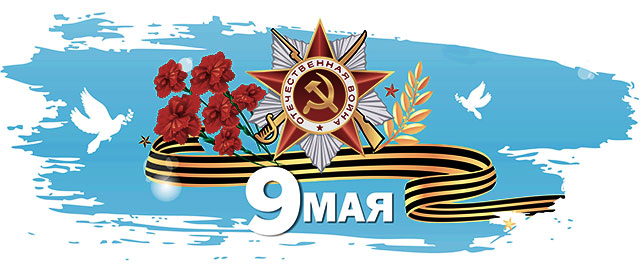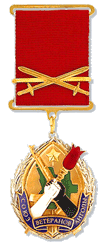|
|
|

ДОРОГИЕ ДРУЗЬЯ!
.jpg) 9 мая 2024 г. в Центральном парке культуры и отдыха (ЦПКиО) им. А.М.Горького, возле «Ажурной беседки» (Ротонды) состоится очередная встреча ветеранов локальных войн – «Наш День Победы». Сбор в 12.30 у Ротонды. Приглашаем, в первую очередь, ветеранов Великой Отечественной войны, вас, ветеранов боевых действий, локальных войн, миротворцев, членов ваших семей. Ветеранов, имеющих боевые награды и право на ношение военной формы одежды – приглашаем воспользоваться этим правом. Будем рады встрече. Начало праздника в 13 часов. Будет время для встреч и общения ветеранов друг с другом, фотографирования, выступления ветеранов и представителей молодого поколения. В связи с принятыми повышенными мерами безопасности, наши традиционные прохождение «Бессмертного полка» по территории парка и праздничный концерт в этом году могут не состояться. Но принесите фотографии своих ветеранов: они будут с нами. А недалеко от «Ажурной беседки» запланировано выступление оркестров. Завершение встречи – в 16.00. В программе возможны изменения.
Организатор и руководитель встречи «Наш День Победы» – член Союза ветеранов Анголы полковник запаса Андрей Александрович Токарев.
|
Leonid Krasov "Onjiva"
Leonid Krasov, soviet military translator, participant of the events near Onjiva in August 1981 (Operation of the South African Armed Forces in Angola "Protea"). Well, just 40 years ago, on this day, my most unforgettable "adventure" began with a length of some 8 days...
Below is a small essay on this topic.
When I was a kid, I spent a lot of time within the premises of the military academy where my Mom used to teach English the so called Cadettes of Kremlin (http://mvoku.mil.ru). I never attended any kinder garden so she took me with her to the academy on the days she had classes and I would wander around watching the cadettes marching and exercising on the drill square. Back then and until graduation from the university years later I never nursed the idea of becoming a professional military.
In early 1981, my graduation year from the Moscow State Linguistic University, I was approached by our Military Faculty Dean (most Soviet universities had military training departments) who offered a two-year mandatory term in the Army as alternative to post graduate civilian life where you still need to find a job to make your living. I need to say that military service was an obligatory thing for all male from 18 to 28 in the Soviet Union so I reckoned it was better to pay back to my Fatherland right away other than being enlisted when you already started making your career elsewhere and have to leave all behind in order to serve two years in the Army. Besides you start as Lieutenant and upon two years of service may have a chance to stay in the Army and continue military career. So were my options and after pondering for a while I said - YES SIR, I want to serve my Fatherland!
But where? That was another question.
Once I and other graduates, who chose the same destiny, got our military IDs, we were invited for an interview with some Colonel from the Ministry of Defense. He was interviewing us one by one making individual offers. With me it was a bit funny and I can’t forget that memorable dialog.
You see son, colonel said, we have two assignment destinations for you. Angola and Guinee Bissau. Which one you chose?
I quickly replied, - Angola, Sir! It starts with the first letter of the alphabet, Sir!
Bingo, right choice son, ‘cos Guinee starts with the fourth letter of the (Russian) alphabet and it sucks, he began to laugh. No need to say what he meant (The word for “shit” in Russian starts with the fourth letter of the Cyrillic alphabet).
So was the Russian military humor, new to me then. And, of course, we don’t treat senior officers by Sir in the Soviet/Russian Army. It is Tavaresh Polkovnik (Comrade Colonel).
Little did I know then what Her Majesty Destiny had prepared for me…
I consider August 27, 1981, my second birthday and here is why...
After 18 hours flight on Aeroflot Ilyushin 62 jet with 3 stopovers in Budapest, Sal Island (Cape Verde) and Brazzaville (Kongo) we finally landed in Luanda on August 7, 1981. A week later, upon a very warm (but slightly too much overboozed in the evenings) check-in party with my new colleagues and job induction at the Soviet Military Mission in Luanda I was assigned to go to Onjiva and to relieve the interpreter in the 11th Infantry Brigade who was supposed to travel back to the USSR to enjoy his 45 days yearly leave. So, after a quick journey to the capital of the 5th Military Region and a brief stay there, I finally reached the Soviet Military Mission in Onjiva on August 14th and the next two weeks were the most memorable in my life. I was treated by my new family as if I was “a son of the regiment”. We had a fantastic team and spent time after work hours together either playing volleyball and socker or gathering in the mission lobby for a movie since we had a 35 mm projection unit and a selection of film strips. Four ladies – the wives of our officers- who hadn’t left for home back to the USSR yet – were very keen on cooking so I would get invitations for mommy-like-home-made dinner nearly every day. One at a time in order not to hurt the feelings of the ladies.
Paradise turned into hell on August 25.
Two short flashes in the night sky ... and a small border town, the capital of Cunene province, plunged into darkness. An accurate hit of two missiles destroyed the local electrical substation and the headquarters of the district border troops. The languid August silence of the cool African night was broken by the sirens of the fire brigade's cars. The tart and heavy smell of gunpowder filled the air.
Half an hour later, the entire group of military advisers gathered at an emergency meeting with the brigade commander, Major Jose Afonso Maria. (The tardy application to assign him the next military rank got stuck somewhere in the offices of the FAPLA General Staff in Luanda). It was necessary to decide what to do with the members of the Soviet families, i.e. with the wives of the four advisers. All the chances for evacuation had been lost. From the "mirages" that had just fired at the city, leaflets were dropped with a joint appeal by the South African occupation forces and the UNITA rebel group to the local civilian population. From these leaflets it followed that all escape routes were cut off for our brigade, and the head of an FAPLA officer or a Soviet adviser would serve as a pass from the iron ring. Nothing was specified about the family members of the Soviet advisers, but it was clear that the only white-skinned at that time were only us, the Russians. Rare Portuguese left the city shortly before.
Just overnight the Cunene Province Commissioner of the MPLA-PT comrade Sinedim (whom we christened among ourselves by consonance in Russian - Blue Smoke) visited the Soviet military mission and suggested, before it was too late, to move our women on horseback through the Mupa National Park to Lubango. However, no orders to that effect had been ever received from our command, and our senior did not dare to make an independent decision. And now, when all the possibilities to get our women out of the encirclement had been lost, all Soviet officers, together with their wives, had to urgently move to a fortified command post, since early in the morning at any moment shelling of the city could begin, followed by a raid of fighter aircraft.
Before leaving for the command post, all the officers of the group gathered in the office of our senior – the adviser to the brigade commander. We drank our “traditional-since-WWII -one-hundred-grams-before-the-combat". The only difference was that due to lack of vodka or pure alcohol (quite a normal thing for us) we drank whisky instead. Then followed the moment of silence... Later, in a secluded place somewhere in the backyard of the mission building we buried documents, personal belongings, and especially valuable inventory, including the movie projector and a dozen of film reels with the News of the Day and Soviet film classics that we watched the uncountable number of times. Nobody could guess then that in a few days everything would be plundered by "kwacha" looters on a tip from one "unreliable" guard of our mission, who preferred to stay in the occupied zone and probably join Savimbi's militants. I can imagine some "kwacha" from head to toe equipped with ammunition and with a Kalashnikov in his hands and dressed in my super-fashionable leather jacket and Wrangler jeans I proudly flaunted in Moscow just a month before...
Shelling and air strikes began around 5 AM on the 27th of August. Before noon it became obvious that the brigade was not cable of resisting the attack. After a brief meeting with the head of staff, the Soviet senior advisor as well as the Province Commissioner, the brigade commander gave orders to retreat. I was ordered to accompany our senior who stayed with the brigade commander and the head of staff while all the rest of the Russians (i.e. 12 people including 4 women) were supposed to escape on two UAZ general purpose vehicles that Nikolay Pestretsov topped up with gas and provision earlier. Later that day, Nikolay’s wife will be killed in an ambush and Nikolay himself will become a prisoner of war. That same ambush will take three more lives – our Artillery advisor Colonel Kireyev and his wife will meet death hand in hand plus Colonel Vazhnik, the ideology advisor, will never come back home to Russia while his daughter will be writing letters to her Daddy anxious to know when he returns. She kept sending her letters until the bodies of the Russians that perished in Onjiva on the 27 of August, 1981 will be returned to Russia a year later and the families of the dead officially notified of what actually happened.
Out of 14 POB in Onjiva on that day we lost 4 people, one was captivated, and 9 managed to escape. And each of those who escaped has his or her story.
My journey to Matala lasted 8 days, we walked 380 kms, we safely crossed Cunene-river despite hungry crocks danger, and we were chased by choppers. Once we were nearly caught, but the termite mound and the shrub around it saved our life as they couldn’t see us while we could literally look them in the eyes – I mean they flew so low that one could clearly see faces of the gunners ready to burst the fire at you any moment.
There were many interesting episodes during that journey, and they are worth a movie script. May be later!
To cut the story short – August 27, 1981 by all means should be considered as my alternative birthday. I could be killed in that ambush or taken prisoner should our senior decide that we move out of encirclement as one group, altogether, all 14 of us on that day. And in such case, I reckon, I wouldn’t be scribbling these lines today!
|
|
|





